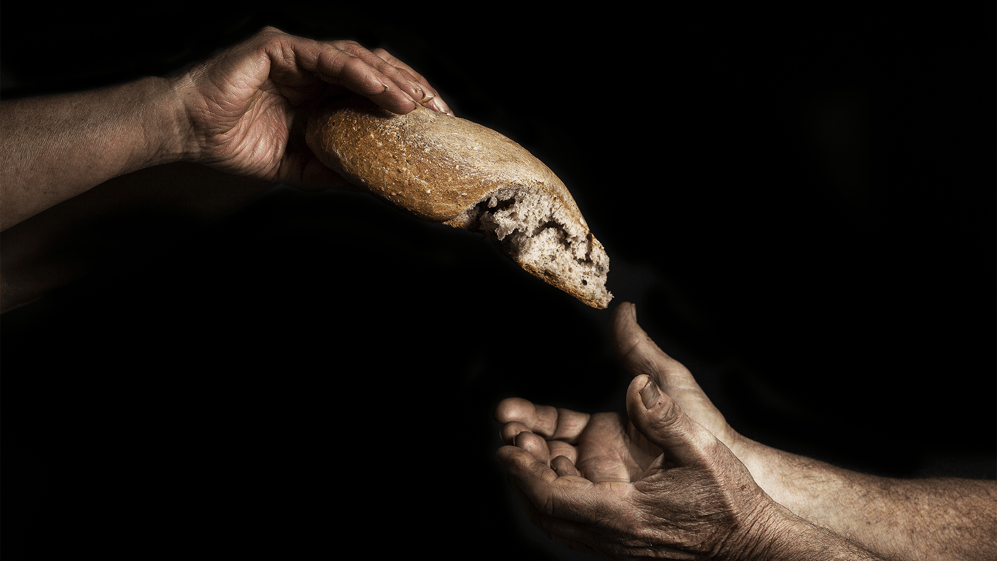Anxiety can get the best of us, but even amidst our struggles, God promises to provide for all our needs. Read what Pastor Phil Rigdon has to say about the anxiety found in Luke 12:22–34.
Setting the Scene
It was January of 1978. Fort Wayne, Indiana, where I lived, and much of the Midwest, experienced a massive blizzard. School was closed for at least a week, as I recall. There were huge mountains of snow from the plowing, and drifts that blew high enough to cover front doors. When the snow finally stopped, there were walks to shovel and forts to be built. I was five years old.
I also recall the days leading up to the blizzard. At the grocery store, one was challenged to find milk, bread, and other basics, as anxious residents cleared the shelves, anticipating isolation following the tempest.
Jesus speaks of anxiety in this weekend’s Gospel, though of a different kind than that described above. To be concerned about groceries in the face of a snowstorm is appropriate and understandable. Jesus refers to being so anxious regarding what is needed in life as to rely on oneself instead of God almighty to provide.
Study
In the first verse of this Gospel passage, Jesus uses the word “therefore.” This signifies that He is now expanding on what was taught above. In the verses preceding our periscope, Jesus teaches the Parable of the Rich Fool, about a man who took in such a great harvest as to feel it needful to build larger gardens. Trusting in the abundance of his gargantuan stores, the man takes no mind for his life, or presumably God, for that matter. Then comes the transitional verse leading to our reading: “So is the one who lays up treasure for himself and is not rich toward God.”
Luke 12:23 reads, “For life is more than food, and the body more than clothing.” Such a statement begs the question, If life is more than food and the body more than clothing, what are they? What is their worth? Jesus wants us to understand that our life and body are of infinite worth because He created them. While food and clothing are needed, they are rudimentary compared to the richness of the life God has given us. In other words, we are to be concerned with more than simply feeding and clothing the body.
The last sentence of Luke 12:24 is also noteworthy. “Of how much more value are you than the birds!” Observe that Jesus is not suggesting that birds are without worth, but rather that human beings are of immeasurably greater value. We recall that Adam (and through Adam, Eve) was the crown of our Lord’s creation. Only into Adam did God breathe. Only humans bear God’s image, broken as it is. To a world that would smugly suggest that human beings are merely complex animals, Jesus asserts differently.
Law
We observe that Jesus prohibits anxiousness over food and clothing. Yet it is completely appropriate to take measures to secure such provisions. There is no sin in purchasing and storing more than what is needed for each day. We recall Joseph in Egypt, and the seven years of plenty followed by seven years of famine. Wisdom dictated storing up for the lean years. Today, some live so far from the grocery store as to render daily trips foolish. It is often also possible to save money by buying in bulk; that savings can then be put to other beneficial use.
Jesus’ concern with anxiousness is linked to idolatry. A wise and diligent heart takes advantage of God’s faithful provision of food and clothing. It gathers and stores, but never forgets the source of all good things, and trusts that the Lord will provide in the future. Such a heart enjoys not only God’s provision but also the peace of mind that results from faith. Contrarily, an anxious heart races about in agitation, having forgotten about God. Such a heart will worship anyone or anything it perceives to be the source of all good things: the earth, false gods, government programs, and finally, oneself.
Anxiousness empowers temptation. If I rely on my own power instead of God to meet my needs, I am more apt to commit sin to meet those needs. An anxious heart shoplifts, falsifies employee timecards, cheats on taxes, and is less inclined to share with the neighbor in need.
Gospel
Why is it that we can give freely to those in need? The Lord is faithful to provide. So generous is our God that it is His pleasure to give us the Kingdom. He gives not only what is needed in this life but also gave His own Son, Jesus Christ, as a ransom for sinners. If God is so willing as to do this, certainly He will be faithful in such things as food and clothing.
Ultimately, this reading is about being rich toward God. If we have the Kingdom, that is, forgiveness of sins and everlasting life, we have everything. The alternative is to be so anxious over the material goods of this world as to die without faith in Jesus, entering eternity poorer than the most desperate of the needful on earth. Jesus is presenting Himself as the riches of the Kingdom. Eternity with Jesus is the money bag that will not grow old, the unfailing treasure that is invulnerable to thieves. Through faith in Christ, we have this treasure, and He is the soothing balm for the anxious heart.
Read more about how you can use your anxiety as a tool to get to know God in Take Heart: God’s Comfort for Anxious Thoughts.














